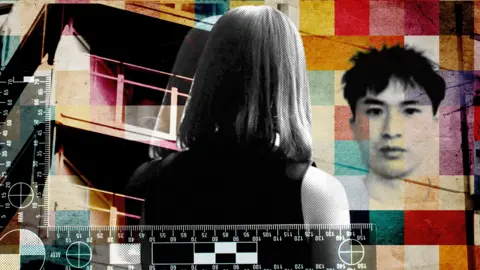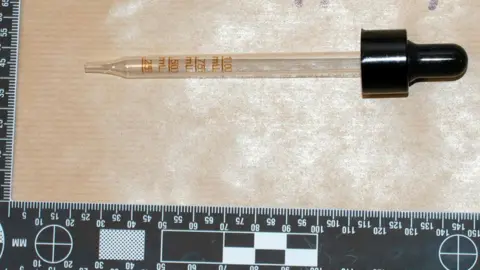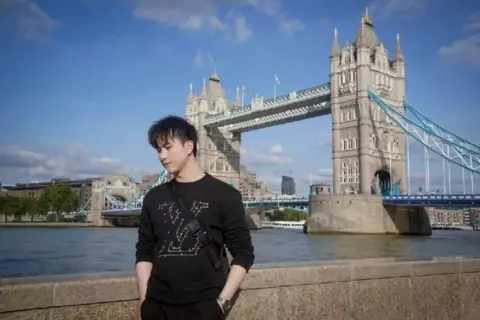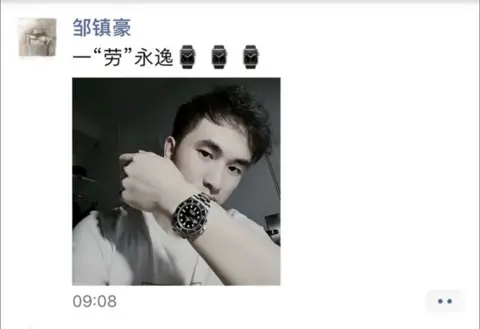Serial drug-rape student – 23 more women make allegations
BBC Global China Unit and BBC News
 BBC
BBCTwenty-three more women have come forward to the police with allegations against serial rapist Zhenhao Zou – a Chinese PhD student found guilty in London last month of drugging and raping 10 women across two continents.
Police said at the conclusion of his trial they had video evidence, filmed by Zou himself, of potentially 50 more victims – and they have been trying to trace these women. Detectives now say, however, that they believe Zou’s “offending group is far greater”.
Warning: This story contains descriptions of sexual violence
Two women who have contacted police in the past month with new allegations have also spoken to the BBC World Service. One said Zou raped her in his hometown in China, after spiking her drink which left her conscious but unable to speak or move. The other said Zou drugged her too – in London – and that she had woken up to find him filming himself sexually assaulting her.
We have also spoken to two women whose testimony helped convict Zou – who will be sentenced in June. “If I had spoken up earlier, maybe there wouldn’t have been so many victims after me,” one of them told us.
She and the other women say they struggle with the guilt of now knowing that Zou has assaulted so many women.
Two bottles on the table
One of the women making new allegations, who we are calling Alice, told the BBC that Zou had assaulted her in London in 2021, but that she had only felt able to go to police after his trial last month. “I didn’t know that was something you could report,” the Chinese national told us.
She says she first met Zou while out clubbing in London with other Chinese-student friends. The group had all added one another on WeChat, a popular social messaging app.
Not long afterwards, a mutual friend invited Alice to have drinks at Zou’s upmarket student accommodation in Bloomsbury.
There were two bottles of spirits on the table, she says, both already opened and half-empty. She began to share drinks from one of the bottles with her friend – but says Zou only drank from the other one.
Alice says her friend normally tolerated alcohol well, but this time became drunk very quickly and appeared to fall asleep on the floor. The alcohol kicked in suddenly for Alice too, she says.
“Normally when you drink too much, you feel good for a while. But that night I just felt extremely dizzy and sleepy right away.”
Zou persuaded her it wouldn’t be safe to take a taxi home in the state she was in, she told us, and asked her to take a nap in his bedroom. She says she agreed, knowing her friend was also still in the apartment.
 Metropolitan Police
Metropolitan PoliceThe next thing she says she remembers is waking up to Zou removing her trousers.
“I stopped him right away,” she says – explaining how she then noticed a torchlight from a mobile phone above her head, and realised, to her horror, that he was filming her.
Alice describes trying to leave his bedroom but being aggressively “yanked back from the doorway”. Zou used such strong force to try to keep her in the bedroom, she says, that she “had to cling on to the door frame with both hands”.
It was only when she threatened to scream for help, that he let go – she told us – with Zou then telling her not to make “a big deal” of things, or to go to the police.
Zou contacted Alice the next day on WeChat, she says, but he made no mention of the previous night. He asked her to dinner but she says she ignored him and they were never in touch again.
Alice confided in a few close friends, but took things no further.
“I thought that, first, you needed evidence. And second, something substantial had to have happened before you could call the police.”
Alice says the next time she saw Zou’s face was nearly four years later in the media – after he was charged by police.
It is challenging for foreign nationals to report sexual crimes in the UK, says Sarah Yeh, a trustee at Southeast and East Asian Women’s Association in London.
“It would be daunting for anyone [from] overseas to be traumatised by rape and then have to navigate the British legal system and the NHS, or even access the services provided for victims,” she told us.
They might not understand their rights or what resources are available to them – she says – as well as being concerned about repercussions, negative impacts on their studies, shame brought on themselves and their families, and potential legal challenges.
About a year after Alice says she was assaulted, she discovered that one of her male friends in London also knew Zou, but had cut all contact because he found out Zou had been spiking women’s drinks.
The friend – who the BBC is calling Jie – told us he “wasn’t surprised at all” when he heard Zou had been convicted.
“A lot of friends at the time probably knew [what Zou was doing]. I reckon some of our female friends knew too.”
Jie told us he accidentally drank from someone else’s glass at a party in 2022, and then became “unwell” and “very sleepy”. Zou then told him he had spiked the drink – says Jie – and had meant for a woman at the party to drink it.
Jie says Zou later showed him a small bag of drugs and asked if he wanted to “collaborate with him”. He says he took from this that Zou wanted his help finding girls whose drinks he could spike. Jie says he refused.
The BBC asked Jie why he had initially continued to see Zou and why he didn’t go to the police. Jie told us they both had lots of mutual friends so it was difficult not to socialise together. He says he did warn his friends about Zou, telling them not to hang out with him “because he was drugging people”.
Jie doesn’t like thinking about those memories, he says, and that is why he hasn’t gone to the police – adding that he had believed the women’s testimonies were enough to convict Zou.
Eventually, Jie says, he did cut all ties with him.

Another young woman who has been in touch with police in London and China since Zou’s trial is “Rachel”. She says she was drugged and raped by him in 2022 in his hometown of Dongguan – in Guangdong province.
Rachel told the BBC she had gone on a date with Zou, having met him online. She thought they were going to a bar, she says, but ended up at his home – a large villa which Zou had described as one of his family’s many properties.
With his back turned to her, she says Zou mixed her a green-coloured cocktail. They then started a drinking game, she says, and she experienced a “wave of dizziness”. Rachel has told UK police that Zou took her up to a bedroom, where she became unable to speak or move her body, and then raped her.
She thought about calling the police the next day, but decided against it. She feared it would be very difficult to prove non-consent. “It’s hard for me to prove the fact that I was willing to go to his place for drinks and that was not a signal that I was consenting to sex,” she told us.
She added that Dongguan is a small place and there was always a risk that people she knew – her parents, relatives and colleagues – would find out and think she was “indiscreet”.
- Details of help and support with sexual violence are available at BBC Action Line
We have seen Rachel’s statement to UK police. She wants her story to be heard now, she says, to encourage more victims to come forward – and because she would like to see Zou prosecuted in China as well as the UK.
Cdr Kevin Southworth – who leads public protection at the Metropolitan Police – told the BBC officers were still working their way through the 23 potential new cases and that some of the people were “definitely not identical” to those featured in Zou’s seized secret footage or from the charge cases for far.
“It speaks to the fact that his offending group is actually far greater than we had realised,” he says.
A second trial for the convicted rapist has not been ruled out and there is “certainly a case” to discuss with the Crown Prosecution Service, given the numbers of women coming forward, he adds.
‘He wears a Rolex submariner watch’
The BBC has also spoken to the only two victims who police were able to identify ahead of Zou’s trial – both are Chinese nationals who had been studying in London. The women got to know each other on social media after one of them, who we are calling Beth, posted about her experience.
Beth was raped by Zou in 2023 and had tried to report the crime to the Metropolitan Police soon afterwards. But then she decided not to pursue things because she felt unsure of UK law and had been left feeling discouraged after her initial interaction with the police, which included a poor translation of her 999 call.
“Back then I didn’t know [Zou’s name]. I didn’t know his address, I could only give general information,” she says.

In frustration, Beth posted a warning on social media about what had happened to her. Another Chinese student, “Clara”, says she “immediately” knew this was the same man who had drugged and raped her after a night out in London’s Chinatown, two years before.
Every detail in Beth’s post pointed to the same man, says Clara: “He has a Guangdong accent, he looks honest and he wears a Rolex submariner watch.”
The women began to speak online and Beth encouraged Clara to report what had happened to her to the police.
Months later, police contacted Beth to say they were re-investigating the case. Clara had come forward.
On Zou’s seized devices, police had also found a video featuring Beth.
The Met has since expressed regret over how it initially handled her allegations.
“We want to avoid situations where victims feel like they’re maybe not being taken seriously, or heaven forbid, being disbelieved,” says Cdr Southworth. Additional training is now being rolled out to all front line officers, he says.
Clara describes a positive experience with British police. She says she didn’t want to fly to London for the trial, in case her parents found out, so the Met sent two officers to China to support her as she gave evidence by video instead.
The officers were assisted by the Chinese authorities, who have been working collaboratively with the Met and are “very supportive”, says Cdr Southworth.
“I hope that can give some encouragement to victim-survivors, wherever they are in the world, that you are safe to come forward.”
Beth – who gave her evidence in court in London – says it was only afterwards that she realised that she and Clara were the only two women to have helped convict Zou.
“I thought for a long time that I wasn’t an important part of the case against Zou,” she says.
Now she is glad she testified and is encouraging other women to come forward.

If you have information about this story that you would like to share with us please get in touch.
You can contact BBC journalist wanqing.zhang@bbc.co.uk – please include contact details if you are willing to speak to her.




